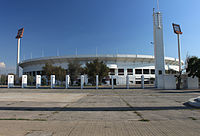1962 FIFA World Cup final
 The Estadio Nacional de Chile held the final | |||||||
| Event | 1962 FIFA World Cup | ||||||
|---|---|---|---|---|---|---|---|
| |||||||
| Date | 17 June 1962 | ||||||
| Venue | Estadio Nacional, Santiago | ||||||
| Referee | Nikolay Latyshev (Soviet Union) | ||||||
| Attendance | 68,679 | ||||||
| Opponent | Result | |
|---|---|---|
| 1 | Mexico | 2–0 |
| 2 | Czechoslovakia | 0–0 |
| 3 | Spain | 2–1 |
| QF | England | 3–1 |
| SF | Chile | 4–2 |
| Opponent | Result | |
|---|---|---|
| 1 | Spain | 1–0 |
| 2 | Brazil | 0–0 |
| 3 | Mexico | 1–3 |
| QF | Hungary | 1–0 |
| SF | Yugoslavia | 3–1 |
The 1962 FIFA World Cup final was the deciding match of the 1962 FIFA World Cup. The match was held at the Estadio Nacional in Santiago, and was contested by Czechoslovakia and Brazil. Brazil won the game 3–1 to record their second consecutive World Cup victory. Both teams had played each other during the group stage which ended in a goalless draw. This was the second World Cup final match featuring teams who had already competed against each other during the group stage (the first was the 1954 final between Hungary and West Germany). This event was on Sunday, June 17, 1962.
This was only the second successful defence of the World Cup title in the history of the competition (after Italy in 1938) in spite of the absence of one of Brazil's star players of 1958, Pelé, who was ruled out of action after being injured during the second match of the tournament.[1]
Match
[edit]Summary
[edit]After 15 minutes, Brazil again found themselves a goal behind in the World Cup final, as a long ball from Adolf Scherer was latched onto by Josef Masopust to put Czechoslovakia 1–0 ahead. However, just like the previous final four years earlier, Brazil soon hit back, equalising two minutes later through Amarildo after an error by the previously flawless Czechoslovak goalkeeper Viliam Schrojf. The Brazilians did not stop there and with goals from Zito and Vavá (another Schrojf error) midway through the second half, the Czechoslovaks could not get back into the game, with the match ending 3–1 to Brazil.[2]
Details
[edit]Brazil
|
Czechoslovakia
|
|

|
| ||||||||||||||||||||||||||||||||||||||||||||||||||||||||||||||||||||||||||||||||||||
|
Assistant referees:
|
Match rules
|
See also
[edit]References
[edit]- ^ "Brazil flying high with 'Little Bird' Garrincha". FIFA.com. Fédération Internationale de Football Association. March 2007. Archived from the original on 6 April 2015. Retrieved 3 January 2018.
- ^ Finále MS ve fotbalu 1962: Československo - Brazílie Archived 10 February 2011 at the Wayback Machine
External links
[edit]- Pages using the JsonConfig extension
- 1962 FIFA World Cup
- FIFA World Cup finals
- Brazil national football team matches
- Czechoslovakia national football team matches
- Brazil at the 1962 FIFA World Cup
- Czechoslovakia at the 1962 FIFA World Cup
- 1960s in Santiago, Chile
- Sports competitions in Santiago
- June 1962 sports events in South America
